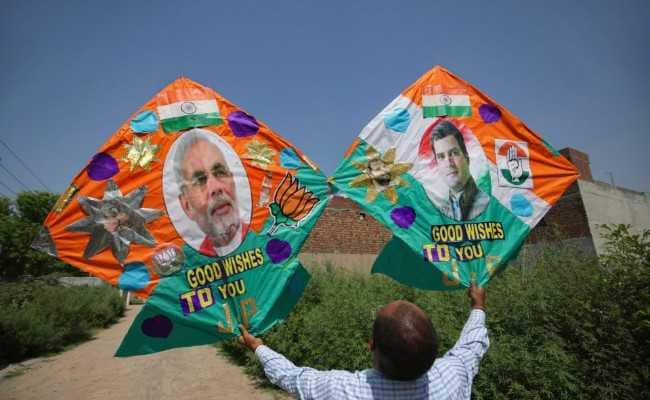
The people's verdict on who rules the world's largest democracy for the next five years, will soon be known as counting of votes begin today for the general elections, held after the most polarized campaign the country has seen. Prime Minister Narendra Modi -- whose BJP became the first party to gain majority on its own in three decades -- seeks a second term in power in face of challenge from a re-energised Congress under Rahul Gandhi and 21 other opposition parties. Exit polls have predicted that the BJP would retain power with a comfortable majority. The Opposition has pointed out that the exit polls often get it wrong. Elections were held on 542 of the 543 Lok Sabha seats and a party or alliance needs 271 seats to form government. The counting will begin at 8 am.
Over the last five years, Prime Minister Narendra Modi has been credited with trying to tighten the administration, a strong foreign policy and high-profile campaigns like Swachh Bharat and make-in-India. But he has been attacked by the opposition over a slowing economy, failure to create jobs, a farm sector crisis and rising hate crimes by right-wing fringe groups. Buoyed by the exit poll estimates, the BJP has prepped a blueprint for its next term, built around the three themes of nationalism, national security and development.
The vitriolic campaign over the last months has seen polarisation not just in terms of religion, but caste, sections and communities. A tweak in the narrative came after the terror strike in Jammu and Kashmir's Pulwama in which 40 soldiers were killed, and the air strikes at Pakistan's Balakot that followed.
Overnight, the BJP built its campaign around the theme of national security and nationalism, and only later, added development to it. The Congress, which kept its focus on the bread and butter issues -- farm sector, jobs and economy - and the controversy over the government's purchase of 36 Rafale jetfighters, was accused of neglecting the nation's security and its armed forces.
As the political discourse went into a downward spiral and complaints piled up in the Election Commission against various leaders -- including the Prime Minister and the BJP chief Amit Shah -- the Supreme Court asked for a prompt resolution. But the Commission's handling of the complaints against PM Modi - where he was given clean chit at every instance -- triggered protests from the opposition, which accused it of being under the thumb of the BJP.
After it was found that all these decisions were made in a 2:1 majority by the three election commissioners and the minority views were not included, the Commission said dissenting views in cases of Model Code violations would not be made public. Election Commissioner Ashok Lavasa, who had dissented, stopped attending meetings of the "full commission" in protest.
The Congress, which won three of the heartland states in December in a round of assembly polls seen as the semi-finals before the national elections, is going solo in most states. Rahul Gandhi, who said he wants to play on the front foot, has inducted sister Priyanka Gandhi Vadra into active politics and placed her in charge of eastern Uttar Pradesh, where PM Modi's constituency Varanasi and Gorakhpur, the stronghold of Chief Minister Yogi Adityanath, is located.
In the run-up to the elections, BJP chief Amit Shah had worked swiftly to bring fractious allies like the Shiv Sena, Nitish Kumar and the Apna Dal on board, holding a series of meetings. The opposition, however, remained divided, with the Congress, Arvind Kejriwal and Mamata Banerjee finding themselves unable to stitch up state-level alliances that could have formed the bulwark against the BJP in Delhi and Bengal.
In Uttar Pradesh too, cooperation was wanting as Mayawati remained determined to keep out the Congress, which finally went solo - a move, critics said, would play into the hands of the BJP. Both Congress and the alliance of Mayawati and Akhilesh Yadav have denied the possibility. Sources said Mayawati has conveyed her desire to be Prime Minister to one of the southern leaders who met her recently, saying her party would support "whoever supports me for Prime Minister".
Bengal Chief Minister Mamata Banerjee, who also harbours national ambition, has been fighting a pitched battle in the state with the BJP, which is targeting 23 of its 42 seats. Exit polls have predicted that the BJP will make major inroads into Bengal, and Odisha - two states where it has little presence. The gains there are expected to offset whatever loss the party sustains elsewhere.
The Opposition demand to tally VVPAT (Voter Verified Paper Audit Trail) slips with the Electronic Voting Machines before votes are counted has been turned down by the Election Commission. The verification from five random polling booths in each assembly segment - made mandatory by the Supreme Court -- will be done after the counting of votes. This, and concerns over the transport of unattended voting machines have been the latest flashpoint between the BJP and the opposition, with the ruling party, in view of the exit poll results, accusing the opposition of being bad losers.

